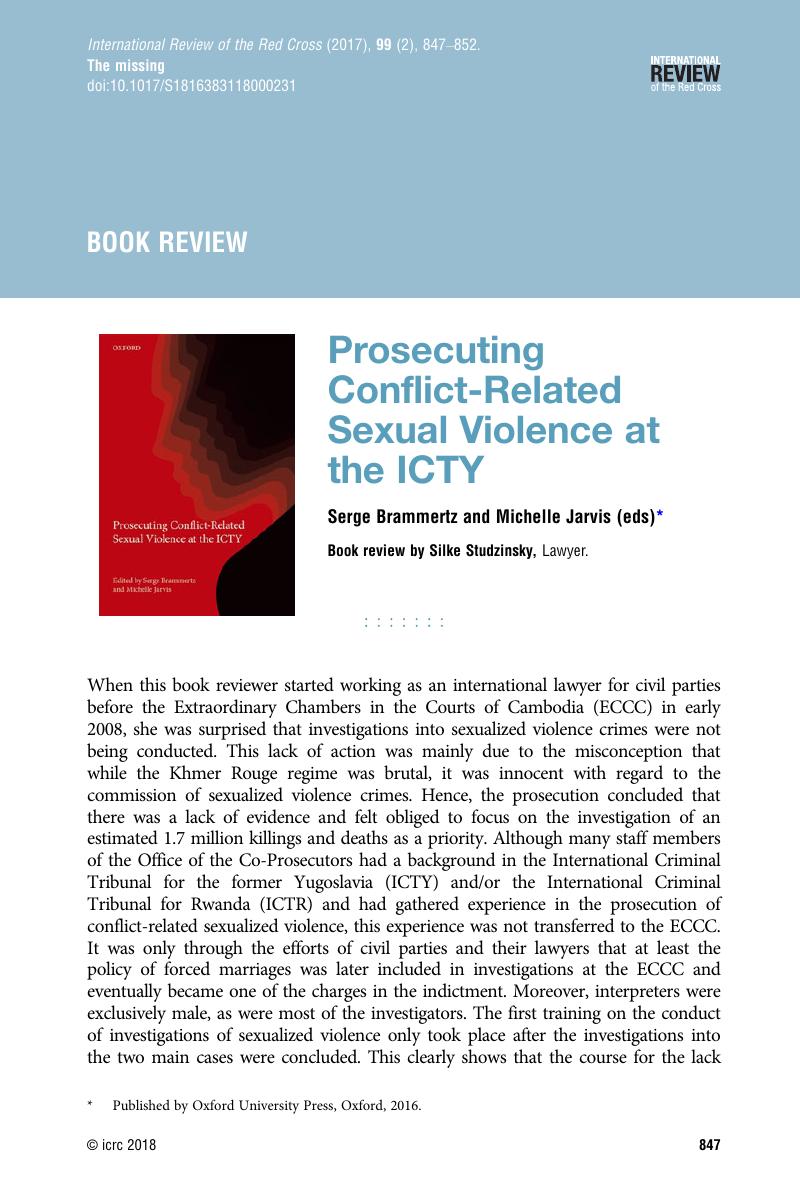No CrossRef data available.
Published online by Cambridge University Press: 04 July 2018

Published by Oxford University Press, Oxford, 2016.
1 The reviewer prefers the term “sexualized” over “sexual” to express that these crimes are not of a sexual nature, but of a violent one.
2 The PSVWG was founded in 2009 in order to improve the prosecution of conflict-related sexual violence. For more information, see ICTY, “Information Sheet: Prosecuting Sexual Violence Legacy Project”, Office of the Prosecutor, May 2015, available at: www.icty.org/x/file/Outreach/sv_files/psv_legacy_project_is.pdf (accessed in March 2018).
3 To name but a few, the OTP of the ICTR published a manual on best practices from lessons learned from the investigation of sexualized violence crimes: ICTR, Best Practices Manual for the Investigation and Prosecution of Sexual Violence Crimes in Post-Conflict Regions: Lessons Learned from the Office of the Prosecutor for the International Criminal Tribunal for Rwanda, 2014; see also Nystedt, Maria (ed.), Nielsen, Christian Axboe and Kleffner, Jann K., A Handbook on Assisting International Criminal Investigations, Folke Bernadotte Academy and Swedish National Defence College, 2011Google Scholar; United Kingdom Foreign and Commonwealth Office, Second Edition of the International Protocol on the Documentation and Investigation of Sexual Violence in Conflict, 2016; Women's Initiatives for Gender Justice, Gender in Practice: Guidelines and Methods to Address Gender Based Crime in Armed Conflict, 2005.
4 Prosecuting Conflict-Related Sexual Violence at the ICTY, pp. 24–28.
5 Ibid., pp. 34–42. A few examples of these assumptions and misconceptions: rape is more a sexual matter involving honour than it is a violent crime; sexualized violence is not as serious as other crimes; sexualized violence is “personally motivated” and/or “opportunistic” (this misconception poses an insurmountable problem when sexualized violence needs to be linked to senior officials); sexualized violence can only be prosecuted if it was committed in a systematic/widespread manner or committed pursuant to an order.
6 Republic of Kosovo, Law No. 04/L-172 on Amending and Supplementing Law No. 04/L-054 on the Status and the Rights of Martyrs, Invalids, Veterans, Members of the Kosovo Liberation Army, Sexual Violence Victims of the War, Civilian Victims and their Families, 20 March 2014.
7 German Federal Parliament, Act to Introduce the Code of Crimes against International Law, 26 June 2002. The Code entered into force at the same time as the Rome Statute, on 1 July 2002. The FDLR trial was the first trial with charges pursuant to the Code.
8 Prosecuting Conflict-Related Sexual Violence at the ICTY, Preface, p. x.